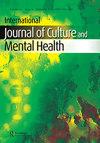An investigation into social work students’ attitudes towards people with mental illness in Greece
Q1 Social Sciences
International Journal of Culture and Mental Health
Pub Date : 2018-10-02
DOI:10.1080/17542863.2018.1561735
引用次数: 2
Abstract
ABSTRACT Bachelor level social work students in Greece were surveyed to assess their attitudes towards the mentally ill in relation to their level of familiarity with mental illness, their demographics and study-related characteristics. The research sample included 370 students who completed a self-report questionnaire including sociodemographic data, the 40-item Community Attitudes towards the Mentally Ill scale (CAMI) and the 11-item Level of Familiarity Questionnaire. Results from analyses showed that the mean Familiarity index was significantly greater in third- and fourth-year students than in those attending the first and second years. Also, scores on Authoritarianism and Social restrictiveness decreased as the year of study increased. Familiarity index was significantly negatively correlated with both the Authoritarianism and Social restrictiveness dimensions. Increased age and year of studies were found to be positively correlated with Benevolence and Community mental health ideology scores. Furthermore, the Familiarity index was positively correlated with both Benevolence and Community mental health ideology dimensions. The results indicate that the year of studies and level of familiarity play a crucial role in students’ attitudes towards people with mental illness. Implications for additional research and education of bachelor level social work students are discussed.希腊社会工作专业学生对精神疾病患者态度的调查
摘要:本研究调查了希腊本科社会工作专业的学生,以评估他们对精神疾病的态度,包括他们对精神疾病的熟悉程度,他们的人口统计学和研究相关特征。研究样本包括370名学生,他们完成了一份自我报告问卷,包括社会人口学数据、40项社区精神疾病态度量表(CAMI)和11项熟悉程度问卷。分析结果表明,三年级和四年级学生的平均熟悉度指数明显高于一年级和二年级学生。此外,“威权主义”和“社会限制”的得分随着学习年份的增加而下降。熟悉度指数与威权主义维度和社会限制维度均呈显著负相关。年龄和学习年限的增加与爱心和社区心理健康意识形态得分呈正相关。熟悉度指数与爱心和社区心理健康意识形态维度均呈显著正相关。结果表明,学习年限和熟悉程度对学生对精神疾病患者的态度起着至关重要的作用。讨论了对社会工作专业本科学生的进一步研究和教育的影响。
本文章由计算机程序翻译,如有差异,请以英文原文为准。
求助全文
约1分钟内获得全文
求助全文
来源期刊

International Journal of Culture and Mental Health
Social Sciences-Cultural Studies
CiteScore
2.10
自引率
0.00%
发文量
0
期刊介绍:
This title has ceased (2018). This important peer-review journal provides an innovative forum, both international and multidisciplinary, for addressing cross-cultural issues and mental health. Culture as it comes to bear on mental health is a rapidly expanding area of inquiry and research within psychiatry and psychology, and other related fields such as social work, with important implications for practice in the global context. The journal is an essential resource for health care professionals working in the field of cross-cultural mental health.Readership includes psychiatrists, psychologists, medical anthropologists, medical sociologists, psychiatric nurses and social workers, general practitioners and other mental health professionals interested in the area. The International Journal of Culture and Mental Health publishes original empirical research, review papers and theoretical articles in the fields of cross-cultural psychiatry and psychology. Contributions from the fields of medical anthropology and medical sociology are particularly welcome. A continuing dialogue between members of various disciplines in various fields is encouraged. The aim of the journal is to encourage its readers to think about various issues which have clouded cross-cultural development of ideas. The journal lays special emphasis on developing further links between medical anthropology, medical sociology, clinical psychiatry and psychology, and implications of the findings on service provisions. The journal is published four times a year. The style of reference is Harvard. All research articles in this journal, including those in special issues, special sections or supplements, have undergone rigorous peer review, based on initial editor screening and anonymized refereeing by at least two independent referees.
 求助内容:
求助内容: 应助结果提醒方式:
应助结果提醒方式:


